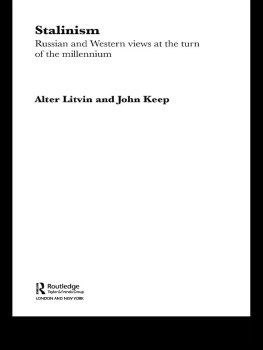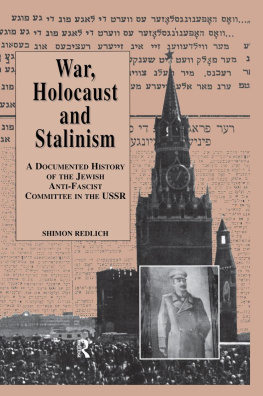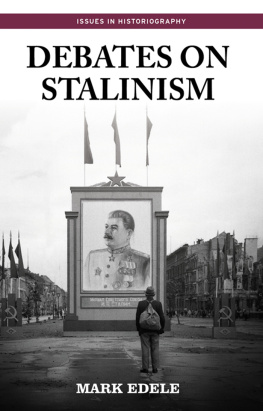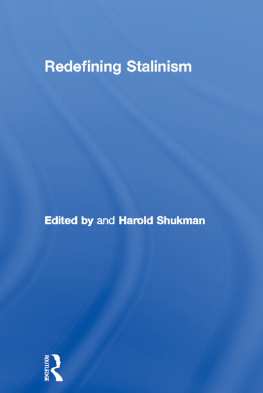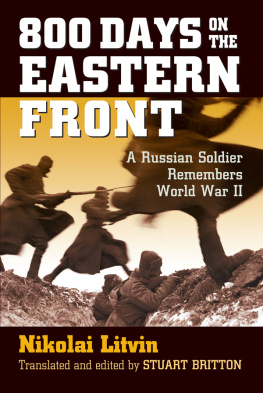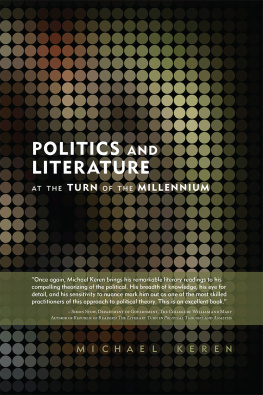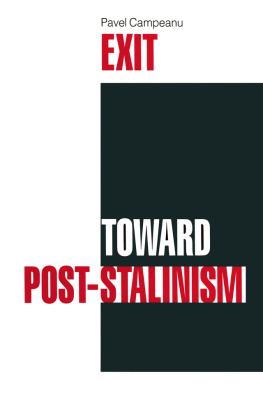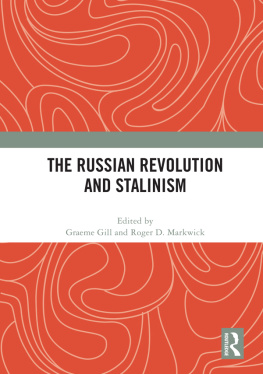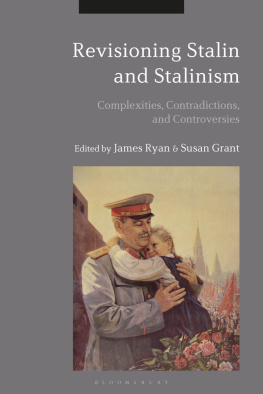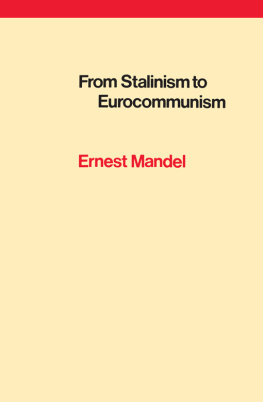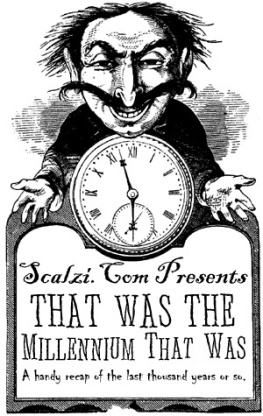Alter Litvin - Stalinism: Russian and Western Views at the Turn of the Millenium
Here you can read online Alter Litvin - Stalinism: Russian and Western Views at the Turn of the Millenium full text of the book (entire story) in english for free. Download pdf and epub, get meaning, cover and reviews about this ebook. year: 2011, publisher: Taylor & Francis Group, genre: Science. Description of the work, (preface) as well as reviews are available. Best literature library LitArk.com created for fans of good reading and offers a wide selection of genres:
Romance novel
Science fiction
Adventure
Detective
Science
History
Home and family
Prose
Art
Politics
Computer
Non-fiction
Religion
Business
Children
Humor
Choose a favorite category and find really read worthwhile books. Enjoy immersion in the world of imagination, feel the emotions of the characters or learn something new for yourself, make an fascinating discovery.
- Book:Stalinism: Russian and Western Views at the Turn of the Millenium
- Author:
- Publisher:Taylor & Francis Group
- Genre:
- Year:2011
- Rating:4 / 5
- Favourites:Add to favourites
- Your mark:
- 80
- 1
- 2
- 3
- 4
- 5
Stalinism: Russian and Western Views at the Turn of the Millenium: summary, description and annotation
We offer to read an annotation, description, summary or preface (depends on what the author of the book "Stalinism: Russian and Western Views at the Turn of the Millenium" wrote himself). If you haven't found the necessary information about the book — write in the comments, we will try to find it.
Alter Litvin: author's other books
Who wrote Stalinism: Russian and Western Views at the Turn of the Millenium? Find out the surname, the name of the author of the book and a list of all author's works by series.
Stalinism: Russian and Western Views at the Turn of the Millenium — read online for free the complete book (whole text) full work
Below is the text of the book, divided by pages. System saving the place of the last page read, allows you to conveniently read the book "Stalinism: Russian and Western Views at the Turn of the Millenium" online for free, without having to search again every time where you left off. Put a bookmark, and you can go to the page where you finished reading at any time.
Font size:
Interval:
Bookmark:

Russian and Western views at the turn
of the millennium

First published 2005 by Routledge
2 Park Square, Milton Park, Abingdon, Oxon OX14 4RN
Simultaneously published in the USA and Canada
by Routledge
270 Madison Ave, New York, NY 10016
Routledge is an imprint of the Taylor & Francis Group
This edition published in the Taylor & Francis e-Library, 2004.
To purchase your own copy of this or any of Taylor & Francis or Routledges collection of thousands of eBooks please go to www.eBookstore.tandf.co.uk.
2005 Alter Litvin and John Keep
All rights reserved. No part of this book may be reprinted or reproduced or utilised in any form or by any electronic, mechanical, or other means, now known or hereafter invented, including photocopying and recording, or in any information storage or retrieval system, without permission in writing from the publishers.
British Library Cataloguing in Publication Data
A catalogue record for this book is available from the British Library
Library of Congress Cataloging in Publication Data
A catalog record for this book has been requested
ISBN 0-203-33892-8 Master e-book ISBN
ISBN 0-415-35108-1 (hbk)
ISBN 0-415-35109-X (pbk)
Introduction
This volume is designed as a contribution to the ongoing debate in Russia and the West on the Soviet past, and more particularly on the years 192953, during which virtually all power was concentrated in the hands of J.V. Stalin and a handful of associates in the upper echelons of the ruling Communist Party, then known as the AUCP(b). The immediate aim is to give students and the interested general public a sense of what has been achieved of late by professional historians in the Russian Federation and in Western countries: to take stock of this literature, to offer encouragement or constructive criticism where it seems to be called for, and to indicate how the gaps in our knowledge might best be filled by future researchers. It is hoped that the bibliographical references will be helpful, even if for practical reasons many of the works cited may at present be hard to obtain. With the rapid development of computer-assisted research tools, this situation is sure to improve in the years to come.
The 1930s, which have been better studied than the post-war era, were years of massive social turbulence, marked by the influx to the towns and construction sites of millions of rural folk displaced by collectivization. Crisis in some sectors of the economy, notably agriculture, was the price paid for rapid growth in others. Giant construction projects symbolized the spirit of the era. The administrative command system of managing the economy led initially to chaos: plan targets were under-fulfilled and statistical data manipulated to conceal the fact. Later, the pace of advance slackened a little; more sophisticated methods of catering to popular needs were developed that paid greater attention to the quality of the goods produced. Nevertheless, the interests of the consumer always took second place to those of the state, eager to promote the development of capital-intensive heavy industry, not least for reasons of national defence.
In the 1930s, the USSR saw itself as an embattled country, a bastion of socialism under siege by ruthless imperialist powers. This image, though exaggerated for propaganda reasons, was not wholly unrealistic since both Japan and, from 1933, Nazi Germany represented serious latent threats to Soviet security. In response, Moscow relaxed its initial hard ideological stance towards limited co-operation with bourgeois democratic states and joined the League of Nations. However, these moves did not signify any departure from Leninist principles of irrevocable class struggle, as interpreted by the current leader.
Josef Stalins personality impregnates the era and will continue to fascinate historians for generations to come. No fully satisfactory biography of the man has yet been written, although there is no lack of worthwhile attempts to do so. Still less information is readily available about the character and careers of his leading associates, such as Molotov, Kaganovich or Zhdanov, although here too biographers are at work. In general, current historiographical fashion favours the study of structures over that of personalities. The way government was carried on has become much better known. There have also been innovative investigations into the plight of the peasantry during the 192931 collectivization drive, the ensuing famine, and many other aspects of social life in town and country. Such matters are now usually studied from below; the masses are no longer simply treated as the object of official policies. The discipline of gender studies boasts several noted specialists on Russian affairs, and the cultural turn has led to work on a wide range of topics from religious beliefs to manners and morals within the working-class household.
This veritable explosion of knowledge stems from the opening up of the former Soviet archives since 1991. This marked the beginning of a new era in scholarship on the Stalin years, both in the Russian Federation and in Western lands. At first, in view of the strict censorship that had prevailed hitherto, every scrap of information was seized on as a revelation. There were, however, remarkably few sensational scoops, and within a few years the tone adopted by researchers became more dispassionate and restrained. The documents that have since been published, in such rich profusion as to make a critical overview difficult, have tended to confirm what independent researchers had long suspected; for example, that the hyper-centralized administration creaked badly, or that there was a good deal of grumbling among the mass of Soviet citizens, which coexisted with genuine enthusiasm among zealots and those eager to rise up in the social hierarchy. Efforts made to establish the degree of support for Party policies among different segments of the population, on the basis of correspondence, petitions and official opinion surveys (svodki) are still in their infancy, but seem to show that the scale of disaffection was greater than had previously been thought.
Fresh details have also become available about the scale and timing of the successive waves of repressive action taken by the Party leadership, with technical assistance from the security services, against real or supposed enemies: former Oppositionists, people with foreign associations, socially dangerous elements who had come into conflict with the law, and so on. Severe punitive measures were applied against all these groups of offenders, including terms of imprisonment in what is today for simplicitys sake usually referred to as the Gulag. It has become abundantly clear that the Moscow show trials, and their counterparts in the provinces, were merely the tip of the iceberg, which for decades concealed from historians attention the mass operations conducted, especially from August 1937 onwards, against a whole host of targets. Within little more than a year these state-sponsored massacres led to the loss of some three-quarters of a million lives by execution alone, not counting those who died in prisons or Gulag camps. The precise reasons for this vast blood-letting are not yet entirely clear, but research in this area is proceeding apace. It is even harder to specify the short- and long-term consequences of the Terror, which were clearly momentous and extend far beyond our cut-off date of 5 March 1953.
Font size:
Interval:
Bookmark:
Similar books «Stalinism: Russian and Western Views at the Turn of the Millenium»
Look at similar books to Stalinism: Russian and Western Views at the Turn of the Millenium. We have selected literature similar in name and meaning in the hope of providing readers with more options to find new, interesting, not yet read works.
Discussion, reviews of the book Stalinism: Russian and Western Views at the Turn of the Millenium and just readers' own opinions. Leave your comments, write what you think about the work, its meaning or the main characters. Specify what exactly you liked and what you didn't like, and why you think so.

